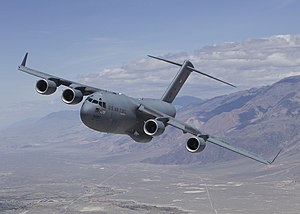
Back Boeing C-17 Globemaster III Afrikaans Boeing C-17 Globemaster III AN بوينغ سي-17 غلوب ماستر 3 Arabic Boeing C-17 Globemaster III Czech C-17 Globemaster III Danish Boeing C-17 German Boeing C-17 Globemaster III Spanish Boeing C-17 Globemaster III Estonian Boeing C-17 Globemaster III Basque بوئینگ سی-۱۷ گلوبمستر ۳ Persian
| C-17 Globemaster III | |
|---|---|
 The prototype C-17, known as T-1, on a test flight in 2007 | |
| General information | |
| Type | Strategic and tactical airlifter |
| National origin | United States |
| Manufacturer | McDonnell Douglas / Boeing |
| Status | In service |
| Primary users | United States Air Force |
| Number built | 279[1] |
| History | |
| Manufactured | 1991–2015[1] |
| Introduction date | 17 January 1995 |
| First flight | 15 September 1991 |
| Developed from | McDonnell Douglas YC-15 |
The McDonnell Douglas/Boeing C-17 Globemaster III is a large military transport aircraft developed for the United States Air Force (USAF) between the 1980s to the early 1990s by McDonnell Douglas. The C-17 carries forward the name of two previous piston-engined military cargo aircraft, the Douglas C-74 Globemaster and the Douglas C-124 Globemaster II.
The C-17 is based upon the YC-15, a smaller prototype airlifter designed during the 1970s. It was designed to replace the Lockheed C-141 Starlifter, and also fulfill some of the duties of the Lockheed C-5 Galaxy. Compared to the YC-15, the redesigned airlifter differed in being larger, having swept wings, and more powerful engines. Development was protracted by a series of design issues, causing the company to incur a loss of nearly US$1.5 billion on the program's development phase. On 15 September 1991, roughly one year behind schedule, the first C-17 performed its maiden flight. The C-17 formally entered USAF service on 17 January 1995. Boeing, which merged with McDonnell Douglas in 1997, continued to manufacture the C-17 for almost two decades. The final C-17 was completed at the Long Beach, California, plant and flown on 29 November 2015.[2]
The C-17 commonly performs tactical and strategic airlift missions, transporting troops and cargo throughout the world; additional roles include medical evacuation and airdrop duties. The transport is in service with the USAF along with air arms of India, the United Kingdom, Australia, Canada, Qatar, the United Arab Emirates, Kuwait, and the Europe-based multilateral organization Heavy Airlift Wing.
The type played a key logistical role during both Operation Enduring Freedom in Afghanistan and Operation Iraqi Freedom in Iraq, as well as in providing humanitarian aid in the aftermath of various natural disasters, including the 2010 Haiti earthquake, the 2011 Sindh floods and the 2023 Turkey-Syria earthquake.
- ^ a b "Workers at Boeing Say Goodbye to C-17 with Last Major Join Thursday" Archived 6 May 2015 at the Wayback Machine. Press-Telegram, 26 February 2015.
- ^ "Final Boeing C-17 Globemaster III Departs Long Beach Assembly Facility" (Press release). Boeing. 29 November 2015. Archived from the original on 7 April 2016. Retrieved 1 June 2016.